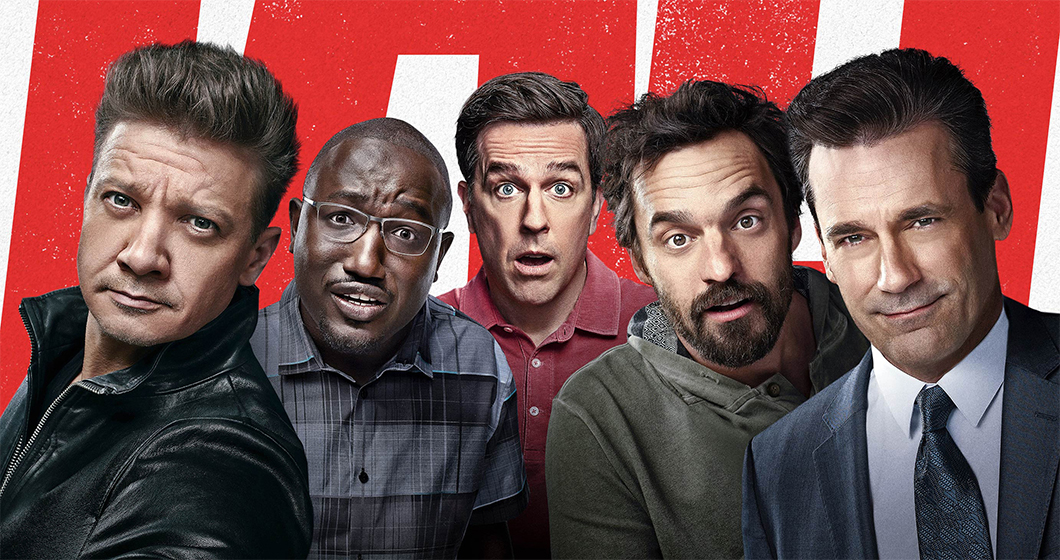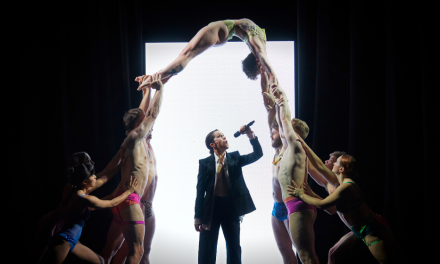There’s a devil’s bargain when you pitch a story to Hollywood. Sure, you lived an interesting story, or spent a long time researching it. But to get it adapted you risk your interesting true story being boiled down to the most generic thing possible. It might end up as something that sounds like a screenwriter lost a bet. It might be even worse. It might end up as Tag.
The film revolves around the apparently true story of a group of friends who play tag every May and have been doing so for 23 years. One member of the group (Jeremy Renner, who you remember as the bow and arrow guy in the Avengers films) has never been tagged in all the years they’ve been playing. He’s about to get married and the friends reunite, also hoping to finally tag him, and, presumably, attend his wedding.
It is a genuinely interesting premise. I mean, tag itself is not a particularly interesting game, nor is it especially cinematic. However, the implications of a group of grown men still playing it well into their adult years, all of them obsessed with the game, has the makings of a good film. Some sort of mediation on self infantilization or the ever discontented upper middle class, or pining for childhood. Or, to go the other way, it could make a great absurdist comedy. It is none of those things.
It’s a bog-standard comedy of the style that Will Ferrel pioneered. The cast is the usual pick and mix of current comedians, featuring the pre-requisite Saturday Night Live alumni, (Ed Helms) somebody from a popular TV show (New Girl’s Jake Johnson) a dramatic actor who has a flair for comedy (Jon Hamm) a stand up comic, (Hannibal Buress) a funny woman who doesn’t get enough lines (Isla Fisher) and a few others who you may or may not recognise as regulars in this style of movie. They aren’t really characters, which is fine, because this isn’t really a film.
Scenes don’t connect to each other; it’s a series of semi-improvised comedy set pieces loosely built around this premise. You could walk in halfway through and not realise it, because no scene really builds on any prior scene. This is not a problem in and of itself. It also describes Caddyshack, Anchorman, and a lot of other films in the same style. But those films, what they lacked in structure, made up for with gags, and in Tag they’re just weak.
Constructing a good joke is hard. It takes structure, timing and delivery, and when most of the jokes are medium shots of actors giving clearly improvised punchlines (or just swearing if they can’t think of a punchline) none of them have any impact. Much like the film as a whole, individual scenes are just stuff happening with no sense of direction. Character motivations are spelled out rather than informing the scene, and everyone is severely underwritten. Renner’s character, especially, is a void for most of the film.
The tag scenes have a bit more effort put into them, but still don’t work. They’re framed as low stakes action scenes in the style of the fights from the recent Sherlock Holmes films, with speed ramping and Jeremy Renner’s smug voiceover breaking down how he’ll beat them. No problem with a comedy film aping a more serious film’s style, but it’s aped poorly, understanding only the cosmetic elements of the Holmes films without the underlying sense of structure or how the voiceover is supposed to frame it.
Part of what ruins the fun is you will end up resenting these characters. It’s a running gag that no one in films or TV has a normal income, house, job or amount of free time, but this makes no effort to make the characters relatable. Everybody’s house is enormous, everyone is absurdly successful in demanding fields, yet everyone can also drop everything to play this game of tag and is miserable that they can’t win it. In fact, in the entire first part of the movie, nobody smiles once. It would have been nice for the film to acknowledge the absurdity of being able to do masses of property damage for a game of tag. But, as I said, every part feels separate from everything else.
Coherence is one of the benefits of actually having a script. The lack of coherence makes the third act twist feel more like them desperately trying to write themselves out of a corner and make this more than a bunch of spoiled idiots. Again, there’s a reason you write the film before you start making it.
Even for the very low bar that this film sets for itself, it fails. It’s not silly enough to be funny, it says nothing about its characters, it barely even has characters. All we get of them is that they are miserable people who can’t tag arrow man, all we get of arrow man is that he is very hard to tag. Humour is subjective, but the funniest part of this film is that it got made.
3/10
Reviewed at Palace Electric






